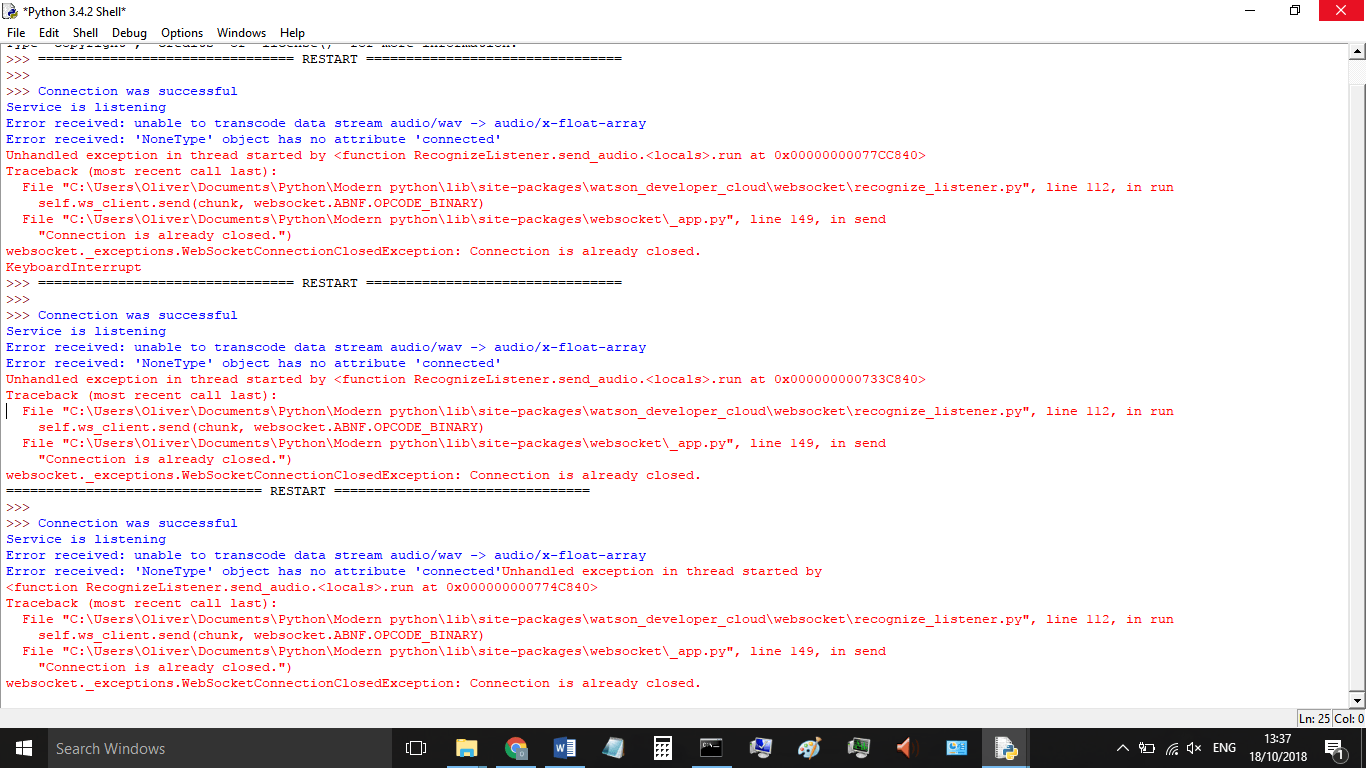STT Watson Python "Получена ошибка: [WinError 10014] Система обнаружила неверный адрес указателя при попытке использовать аргумент указателя в вызове"
Недавно я попытался создать программу, которая может превращать живой аудиопоток в текст и искать его по ключевому слову. Затем я хотел бы активировать другую функцию прослушивания. Мой текущий код выглядит следующим образом (без второй функции прослушивания):
from __future__ import print_function
import json
from os.path import join, dirname
from watson_developer_cloud import SpeechToTextV1
from watson_developer_cloud.websocket import RecognizeCallback, AudioSource
import threading
# If service instance provides API key authentication
# service = SpeechToTextV1(
# ## url is optional, and defaults to the URL below. Use the correct URL for your region.
url='https://stream.watsonplatform.net/speech-to-text/api',
# iam_apikey='your_apikey')
service = SpeechToTextV1(
username='MY USERNAME',
password='MY PASSWORD',
url='https://stream.watsonplatform.net/speech-to-text/api')
"""
models = service.list_models().get_result()
print(json.dumps(models, indent=2))
model = service.get_model('en-US_BroadbandModel').get_result()
print(json.dumps(model, indent=2))
with open(join(dirname(__file__), 'audio-file.flac'),
'rb') as audio_file:
print(json.dumps(
service.recognize(
audio=audio_file,
content_type='audio/flac',
timestamps=True,
word_confidence=True).get_result(),
indent=2))
`"""
# Example using websockets
class MyRecognizeCallback(RecognizeCallback):
def __init__(self):
RecognizeCallback.__init__(self)
def on_transcription(self, transcript):
print(transcript)
def on_connected(self):
print('Connection was successful')
def on_error(self, error):
print('Error received: {}'.format(error))
def on_inactivity_timeout(self, error):
print('Inactivity timeout: {}'.format(error))
def on_listening(self):
print('Service is listening')
def on_hypothesis(self, hypothesis):
print(hypothesis)
def on_data(self, data):
print(data)
# Example using threads in a non-blocking way
mycallback = MyRecognizeCallback()
audio_file = open(join(dirname(__file__), 'audio-file.flac'), 'rb')
audio_source = AudioSource(audio_file)
recognize_thread = threading.Thread(
target=service.recognize_using_websocket,
args=(audio_source, "audio/wav; rate=44100", mycallback))
recognize_thread.start()
Этот код в настоящее время возвращает следующую ошибку:
Error received: unable to transcode data stream audio/wav -> audio/x-float-array
Error received: 'NoneType' object has no attribute 'connected'
Прилагается все, что вернул python:
В настоящее время я использую 64-разрядную Windows 10 с Python 3.4.2
РЕДАКТИРОВАТЬ:
Похоже, что сообщение об ошибке изменилось на следующее:
Error received: unable to transcode data stream audio/wav -> audio/x-float-array
Error received: [WinError 10014] The system detected an invalid pointer address in attempting to use a pointer argument in a call
0 ответов
РЕДАКТИРОВАТЬ: ваш сценарий не работает, потому что вы смешиваете аудио / WAV с аудио / FLAC. Они разных форматов и не взаимозаменяемы.
Использование этого кода будет работать, хотя я не тестировал его запуск через поток.
with open("audio-file.flac", "rb") as audio_file:
audio_source = AudioSource(audio_file)
print("Sending file to Watson...")
stt_auth.recognize_using_websocket(
audio=audio_source,
content_type="audio/flac",
recognize_callback=mycallback,
interim_results=True, # Print all attempts, including not final responses.
)
Я хотел бы попытаться настроить поток с именем файла в качестве аргумента. Обратите внимание, что я не проверял это сам, но это должно работать.
def play_audiofile(name):
with open("audio-file.flac", "rb") as audio_file:
audio_source = AudioSource(audio_file)
print("Sending file to Watson...")
stt_auth.recognize_using_websocket(
audio=audio_source,
content_type="audio/flac",
recognize_callback=mycallback,
interim_results=True, # Print all attempts, including not final responses.
)
play_file_in_background = Thread(target=play_audiofile, args="audio-file.flac")
play_file_in_background.start()
while play_file_in_background.isAlive():
pass # Don't end until it has finished
